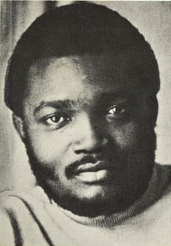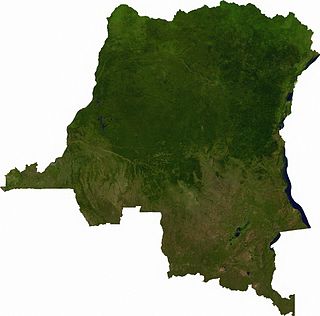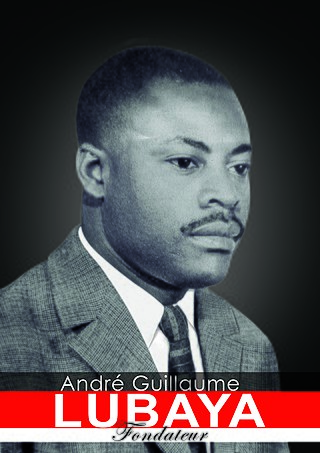Related Research Articles
The earliest known human settlements in what is now the Democratic Republic of the Congo have been dated back to the Middle Stone Age, approximately 90,000 years ago. The first real states, such as the Kongo, the Lunda, the Luba and Kuba, appeared south of the equatorial forest on the savannah from the 14th century onwards.

François Luambo Luanzo Makiadi was a Congolese singer, guitarist, songwriter, bandleader, and cultural revolutionary. He was a central figure in 20th-century Congolese and African music, principally as the bandleader for over 30 years of TPOK Jazz, the most popular and influential African band of its time and arguably of all time. He is referred to as Franco Luambo or simply Franco. Known for his mastery of African rumba, he was nicknamed by fans and critics "Sorcerer of the Guitar" and the "Grand Maître of Zairean Music", as well as Franco de Mi Amor by female fandom. AllMusic described him as perhaps the "big man in African music". His extensive musical repertoire was a social commentary on love, interpersonal relationships, marriage, decorum, politics, rivalries, mysticism, and commercialism. In 2023, Rolling Stone ranked him at number 71 on its list of the 250 Greatest Guitarists of All Time.

The University of Kinshasa, colloquially known as UNIKIN, is a public university located in Kinshasa's Lemba commune within the western region of the Democratic Republic of the Congo. It is the country's premier university. Initially established in 1954 as Lovanium University during Belgian colonial rule, the current university was established following the division of the National University of Zaire (UNAZA) in 1981.

Articles related to the Democratic Republic of the Congo include:

The Republic of the Congo was a sovereign state in Central Africa, created with the independence of the Belgian Congo in 1960. From 1960 to 1966, the country was also known as Congo-Léopoldville to distinguish it from its northwestern neighbor, which is also called the Republic of the Congo, alternatively known as "Congo-Brazzaville". In 1964, the state's official name was changed to the Democratic Republic of the Congo, but the two countries continued to be distinguished by their capitals; with the renaming of Léopoldville as Kinshasa in 1966, it became also known as Congo-Kinshasa. After Joseph Désiré Mobutu, commander-in-chief of the national army, seized control of the government in 1965, the Democratic Republic of the Congo became the Republic of Zaire in 1971. It would again become the Democratic Republic of the Congo in 1997. The period between 1960 and 1964 is referred to as the First Congolese Republic.

Bernardin Mungul Diaka was a Congolese/Zairean diplomat and politician.
The Zaire Use, also called Zairean Rite, officially the Roman Missal for the Dioceses of Zaire, is a Congolese liturgical use of the Roman Rite within the Catholic Church. Approved by the Vatican in 1988, it contains many elements from the Ordinary Form of the Roman Rite, but also incorporates elements from sub-Saharan African culture, particularly Congolese, including a number of inculturated liturgical modifications.

The National University of Zaire was a federated university in Zaire which existed between 1971 and 1981.

Justin-Marie Bomboko Lokumba Is Elenge, was a Congolese politician and statesman. He was the Minister of Foreign Affairs for the Congo. He served as leader of the Congolese government as chairman of the College of Commissioners. He also served as Foreign Minister for three different tenures: 1960–1963, 1965–1969, and again in 1981. Bomboko died from a long-illness in Brussels, Belgium, aged 85.
Justin Bitakwira Bihona-Hayi is a Congolese politician and a member of the National Assembly. He is the founder of the Alliance pour la République et la Conscience Nationale political party (ARCN) and a member of the Union for the Congolese Nation. He has been affiliated with several political parties, including the Union for Democracy and Social Progress (UDPS) and the People's Party for Reconstruction and Democracy (PPRD). He held various government positions, including Minister of Rural Development, Minister of Communication and Media and Minister of Relations with Parliament. As a minister, his political principles were described as nationalist, populist, opportunist, reformist, tribalist, and protectionist.
Joseph-Georges Kasongo was a Tanganyikan-born Congolese lawyer, businessman, and politician who served as the first President of the Chamber of Deputies of the Republic of the Congo. He later held office as a deputy prime minister and as a senator.

Marcel Antoine Lihau or Ebua Libana la Molengo Lihau was a Congolese jurist, law professor and politician who served as the inaugural First President of the Supreme Court of Justice of the Congo from 1968 until 1975, and was involved in the creation of two constitutions for the Democratic Republic of the Congo.
Jean-Chrysostome Weregemere or Weregemere Bingwa Nyalumeke was a Congolese politician who led a faction of the Centre du Regroupement Africain. He served as Minister of Agriculture in the Congolese government from August 1961 until July 1962 and then as Minister of Justice until December 1962. Weregemere later held prominent positions in parastatals and sat on the central committee of the Mouvement Populaire de la Révolution from 1980 until 1985.

André Guillaume Lubaya was a Congolese politician who served twice as the President of Kasai Province and later as the Minister of Economy of the Democratic Republic of the Congo. He was the founder of the Union Démocratique Africaine.
Pascal Nkayi was a Congolese politician. He served as Minister of Finance of Republic of the Congo from June until September 1960.
Isidore Ndaywel è Nziem, is a Congolese historian and linguist. He is the author of several essays, studies and other publications about the history of the Congo, including the overview work L'histoire générale du Congo: De l'héritage ancien à la République démocratique.
During the presidency of President Mobutu Sese Seko of the Democratic Republic of the Congo, later Republic of Zaire (1965-1997), social and political rights were strongly curtailed. As a consequence, several Congolese/Zairean citizens went into exile for political reasons.

The Lemera massacre, also known as the Lemera Attack or Lemera Battle, which occurred on October 6, 1996, was a massacre perpetrated by the Alliance of Democratic Forces for the Liberation of Congo (AFDL) at Lemera Hospital, a medical facility in the small town of Lemera, about 85 kilometers northwest of Uvira in the South Kivu Province of the Democratic Republic of the Congo (DRC). 37 individuals were killed, according to the United Nations Mapping Report.
The Party of the People's Revolution was a clandestine communist party in the Democratic Republic of the Congo, later known as Zaire. The PDP was a Marxist political movement born in the convulsions of the Congolese crisis, being founded in 1967 in Fizi by Laurent-Désiré Kabila, who decades later would overthrow Mobutu and take control of the country.

The Battle of Kisangani took place in March 1997 during the First Congo War. The rebels of the Alliance of Democratic Forces for the Liberation of Congo (AFDL), supported by the Rwandan Patriotic Front, took the city defended by the Zairian Armed Forces (FAZ) which was loyal to President Mobutu Sese Seko.
References
- 1 2 3 4 Bazenguissa-Ganga, Rémy. Les voies du politique au Congo: essai de sociologie historique . Paris: Karthala, 1997. p. 192
- 1 2 3 Interview de Jonas Caddy Cadima Archived 2009-01-06 at the Wayback Machine
- ↑ Revue française d'études politiques africaines, Issues 73-78. Société africaine d'édition. 1972. p. 102. OCLC 1764168.